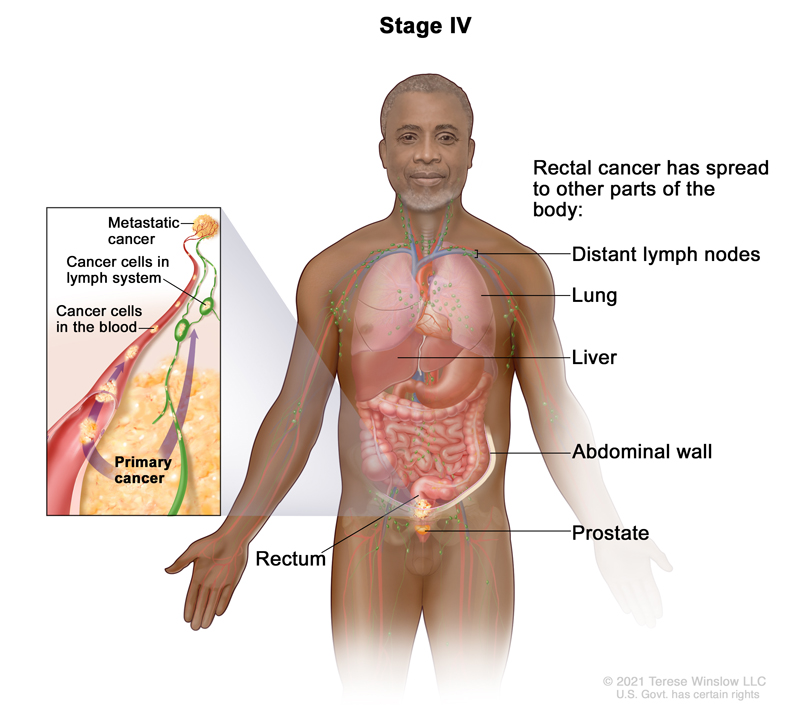Stage 4 Rectal Cancer is divided into stages 4A, 4B and 4C. Stage 4 Rectal Cancer means the cancer has spread to other parts of the body, such as the liver or lungs. It’s also called advanced bowel cancer.
Understanding your Stage 4 Rectal Cancer diagnosis will help you partner with your doctors to make the best treatment choice for you.
Stage 4 Rectal Cancer ICD 10 is C20.
Tap “Watch Now” to learn more and for an easy-to-understand overview of the cancer stage.
- Stage 4A Rectal Cancer
- Stage 4B Rectal Cancer
- Stage 4C Rectal Cancer
Overview
A Stage 4A Rectal Cancer diagnosis means that the cancer has spread from your rectum, through the blood and lymph nodes to one other part of your body, such as liver, lungs, bones, etc.
What Tests Will I Need and Why?
A Rectosigmoidoscopy (a thin tube with a camera that is introduced through your anus to see the inside of your colon) is usually the first step to identify the tumor inside your colon and take samples for analysis.
Blood and Imaging tests are done to understand your general health, confirm your diagnosis and determine your cancer stage.
Tissue analysis is also typically done through a biopsy to identify certain biomarkers and mutations, which is critical to finding the best treatment option for you. In Colorectal Cancer, there are 4 common biomarkers that can be found: RAS mutations (NRAS and KRAS), BRAF mutation, Microsatellite Instability High (MSI-H) and HER2. 40-50% of Colorectal Cancers have a RAS mutation.
If your treatment team has not already performed tests to determine your cancer’s features, please ask your doctor when these tests will be performed.
Re-read this summary as needed and then tap, “Compare My Treatment Options Now“. Our unique Comparison Page will help you understand your FDA-approved treatment options including, who can help you pay for your treatment, where and how each is given and what side-effects you may experience.

National Institute of Health/ treatment-rectal
Overview
Stage 4B Rectal Cancer diagnosis means that the cancer has spread from your rectum, through your blood and lymph nodes to more than one other part of your body, such as liver, lungs, bone, etc.
What Tests Will I Need and Why?
A Rectosigmoidoscopy (a thin tube with a camera that is introduced through your anus to see the inside of your colon) is usually the first step to identify the tumor inside your colon and take samples for analysis.
Blood and Imaging tests are done to understand your general health, confirm your diagnosis and determine your cancer stage.
Tissue analysis is also typically done through a biopsy to identify certain biomarkers and mutations, which is critical to finding the best treatment option for you. In Colorectal Cancer, there are 4 common biomarkers that can be found: RAS mutations (NRAS and KRAS), BRAF mutation, Microsatellite Instability High (MSI-H) and HER2. 40-50% of Colorectal Cancers have a RAS mutation.
If your treatment team has not already performed tests to determine your cancer’s features, please ask your doctor when these tests will be performed.
Re-read this summary as needed and then tap, “Compare My Treatment Options Now“. Our unique Comparison Page will help you understand your FDA-approved treatment options including, who can help you pay for your treatment, where and how each is given and what side-effects you may experience.

National Institute of Health/ treatment-rectal
Overview
Stage 4C Rectal Cancer diagnosis means that the cancer has spread to the tissue that lines the wall of your abdomen called the peritoneum. It also may have spread to other areas or organs.
What Tests Will I Need and Why?
A Rectosigmoidoscopy (a thin tube with a camera that is introduced through your anus to see the inside of your colon) is usually the first step to identify the tumor inside your colon and take samples for analysis.
Blood and Imaging tests are done to understand your general health, confirm your diagnosis and determine your cancer stage.
Tissue analysis is also typically done through a biopsy to identify certain biomarkers and mutations, which is critical to finding the best treatment option for you. In Colorectal Cancer, there are 4 common biomarkers that can be found: RAS mutations (NRAS and KRAS), BRAF mutation, Microsatellite Instability High (MSI-H) and HER2. 40-50% of Colorectal Cancers have a RAS mutation.
If your treatment team has not already performed tests to determine your cancer’s features, please ask your doctor when these tests will be performed.
Re-read this summary as needed and then tap, “Compare My Treatment Options Now“. Our unique Comparison Page will help you understand your FDA-approved treatment options including, who can help you pay for your treatment, where and how each is given and what side-effects you may experience.

National Institute of Health/ treatment-rectal
Recommended Rectal Cancer Videos

Colorectal Cancer
Overview and Introduction

How Cancer Spreads
Metastatic = Advanced

Diagnosing Your Cancer
How Does a CT Scan Work?

Diagnosing Your Cancer
How Does a PET Scan Work?

Exercise! You Can Do It
Reducing Side Effects & More
Commonly Searched Questions
Stage 4 Rectal Cancer Survival Rate
According to SEER data, Stage 4 Rectal Cancer has a survival rate of 14%. For example, if the 5-year relative survival rate for a specific stage of rectal cancer is 14%, it means that patients who have that cancer are, on average, about 14% as likely as patients who don’t have that cancer to live for at least 5 years after being diagnosed.
Source: Cancer.org
Stage 4 Rectal Cancer Symptoms
Rectal cancer symptoms are more noticeable in stages 3 and 4. These includes:
- changes in stool color
- changes in stool shape, such as narrowed stool
- blood in the stool
- excessive fatigue
- vomiting
- constipation/diarrhea
- abdominal cramps
- Other symptoms will depend on the organs affected with metastases
Source: Webmd.com
Stage 4 Rectal Cancer Treatment
Although stage 4 rectal cancer means that your tumor has caused metastases, some patients may be good candidates for surgery. Now click here to Compare Your Latest Treatment Options.
Source: Cancer.org
Stage 4 Rectal Cancer Recurrence Rate
The recurrence rate for Stage 4 Rectal Cancer is not specifically detailed in terms of exact percentages. Stage 4 Rectal Cancer, which has spread to distant parts of the body, generally has a lower survival rate and higher risk of recurrence compared to earlier stages.
Overall, the 5-year survival rate for Stage 4 Rectal Cancer is approximately 15% to 20%. This reflects the percentage of patients who live at least 5 years after diagnosis. The risk of recurrence is high due to the advanced stage of the disease and its spread beyond the rectum.
For detailed and personalized information, including recurrence risks and management options, consulting with an oncologist or healthcare provider is recommended.
Source: Verywellhealth.com
Stage 4 Rectal Cancer Definition
Stage 4 rectal cancers have spread from the colon to distant organs and tissues. Rectal cancer most often spreads to the liver, but it can also spread to other places like the lungs, brain, peritoneum (the lining of the abdominal cavity), or to distant lymph nodes.
Source: Cancer.gov
Stage 4 Rectal Cancer Prevention
Specific prevention strategies for Stage 4 Rectal Cancer, which is an advanced stage where the cancer has spread to distant parts of the body, are not detailed. However, general recommendations to reduce the risk of colorectal cancer, which can include rectal cancer, are:
- Healthy Diet: Eat a diet rich in fruits, vegetables, whole grains, and legumes, and limit red and processed meats.
- Maintain a Healthy Weight: Achieve and maintain a healthy weight through a balanced diet and regular physical activity.
- Regular Screenings: Follow recommended screening guidelines, especially if you are at higher risk due to family history or other factors. Early detection can help manage or prevent the progression of cancer.
- Avoid Smoking: Do not smoke and avoid exposure to tobacco smoke.
- Limit Alcohol Intake: Consume alcohol in moderation or not at all.
These measures focus on reducing risk factors associated with colorectal cancer and supporting overall health. For personalized guidance and risk management, consulting a healthcare provider is recommended.
Source: Webmd.com






